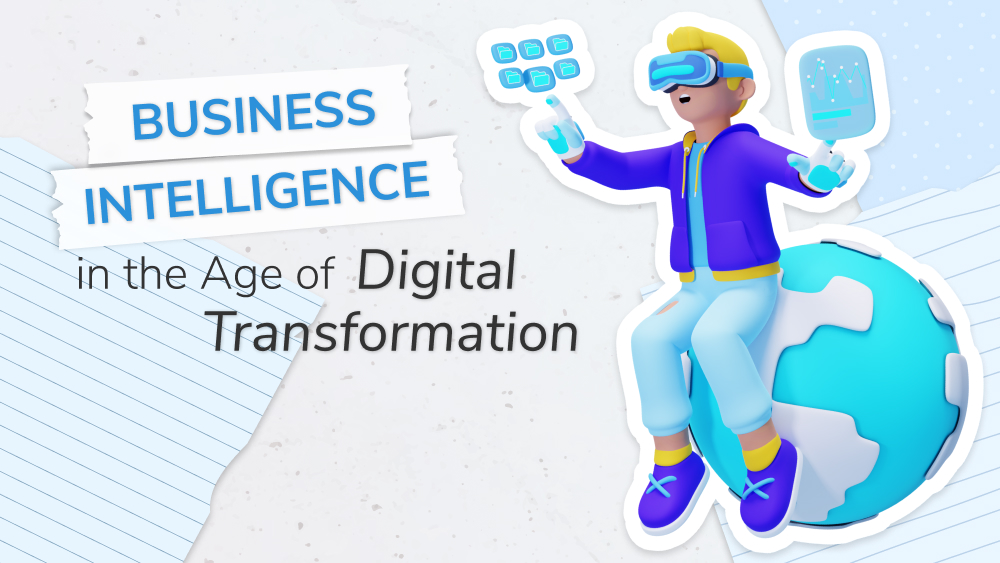
Future of Business Intelligence in the Age of Digital Transformation

Content Map
More chaptersIn today’s rapidly evolving development of software technologies, business users have access to an unprecedented amount of data. However, without the right tools and strategies in place, this information can be overwhelming and difficult to make sense of. This is where business intelligence (BI) comes in. Defined as the process of data analytics and data quality management to make informed business decisions, business intelligence tools have become increasingly important in the age of digital transformation.
Digital transformation refers to the integration of digital technology into all areas of an enterprise, resulting in fundamental changes to how organizations operate and deliver value to the target audience. With the rise of digital platforms, mobile devices, and the Internet of Things (IoT), businesses are collecting vast amounts of data from a variety of sources. This data can be used to gain insights into customer behavior, optimize operations, and drive innovation.
In this article, we will explore the future of business intelligence in the age of digital transformation. We will discuss the challenges and opportunities presented by this new era of data-driven decision-making and examine the technologies and strategies that are shaping the future of BI solutions. Whether you are a business owner, a data analyst, or simply interested in the latest trends in technology and business, this article will provide valuable insights into the future of BI in the age of digital transformation.
The Evolution of Business Intelligence
Business Intelligence (BI) has come a long way since its inception in the 1960s. Over the years, BI has evolved from a simple reporting tool to a complex set of self-service BI technologies and strategies that enable businesses to make data-driven decisions. Let’s take a closer look at the evolution of business intelligence from its traditional roots to modern-day applications.
Traditional business intelligence was focused primarily on descriptive analytics. It involved data collection from various sources, storing it in a data warehouse, and generating reports to help decision-makers understand what had happened in the past. The process was time-consuming and often required IT support to create and manage reports. This approach also had limitations in terms of the amount and complexity of data that could be analyzed.
Modern business intelligence, on the other hand, is designed to handle the increasing data volume and complexity generated by today’s digital landscape. It is focused on predictive and prescriptive data analysis, using advanced algorithms and machine learning to identify patterns and predict future outcomes. Modern BI tools also offer real-time data processing, natural language processing, and embedded analytics, making it possible to get insights and make decisions faster than ever before.
One of the most significant differences between traditional and modern BI is the shift toward self-service analytics. Modern BI tools are designed to be user-friendly, allowing business users to query and analyze data without needing technical expertise. This democratization of data has transformed the way businesses operate, enabling decision-makers at all levels to make informed decisions based on data insights.
Another significant development in modern BI is the integration of big data and IoT technologies. The growing number of connected devices and the explosion of data generated by them have created new opportunities for businesses to gain insights into customer behavior, optimize operations, and drive innovation.
Impact of Digital Transformation on the Future Business Intelligence

Digital transformation has a significant impact on the future of BI. With the rise of digital platforms, mobile devices, and the Internet of Things (IoT), businesses are collecting vast amounts of data from a variety of sources.
Increasing Data Volume and Variety
The amount and diversity of data generated by digital transformation have created new challenges and opportunities for BI. Traditional BI tools were designed to handle structured data, such as transactional data from a database. However, with the increasing volume and variety of data generated by digital transformation, modern BI tools must be able to handle unstructured data, such as social media data, sensor data, and multimedia data.
Real-time Data Access
In the age of digital transformation, businesses need to be able to access data in real-time to make informed decisions quickly. Modern BI tools are designed to provide real-time data access, enabling decision-makers to respond to changing business conditions quickly.
Real-time access to data is made possible by modern BI tools that can process and analyze large volumes of data in real time. These tools use technologies such as in-memory computing, stream processing, and event-driven architecture to process and analyze data as it is generated.
Greater Focus on Predictive Analytics
As businesses become more data-driven, the focus of BI has shifted from descriptive analytics to predictive analytics. Predictive analytics uses machine learning algorithms to define patterns and predict future outcomes. With the increasing volume and variety of data generated by digital transformation, predictive analytics is becoming increasingly important for businesses to gain insights into customer behavior, optimize operations, and drive innovation.
The Importance of Data Governance
With the increasing volume and variety of data generated by digital transformation, the importance of data governance has become more critical than ever. Data governance involves the management of data availability, usability, integrity, and security. It ensures that data is accurate, consistent, and secure, enabling decision-makers to make informed decisions based on trustworthy data.
Future Trends in Business Intelligence
Business intelligence is a rapidly evolving field, and the future trends in BI are exciting and promising. Here are some of the most important trends that are shaping the future of BI.
Artificial Intelligence (AI) and Machine Learning (ML)
The integration of AI and ML into BI is one of the most significant trends shaping the future of BI. AI and machine learning algorithms can analyze enormous amounts of data and identify patterns that would be difficult or impossible to detect using traditional BI methods. This can enable organizations to gain insights into customer behavior, optimize operations, and drive innovation.
Collaborative Business Intelligence
Collaborative BI involves the sharing of data and insights across different departments and teams within an organization. This can enable decision-makers at all levels to make informed decisions based on data insights. Collaborative BI also promotes transparency, accountability, and cross-functional collaboration, making it easier for businesses to achieve their goals.
The Rise of Augmented Analytics
Augmented analytics refers to the integration of AI and machine learning into BI tools to automate the process of data preparation, analysis, and visualization. This can enable businesses to gain insights more quickly and accurately without requiring technical expertise. Augmented analytics can also help businesses identify patterns and trends that would be challenging to detect using traditional BI methods.
Voice-activated Business Intelligence
Voice-activated BI is another trend that is shaping the future of BI. Voice-activated BI involves the use of natural language processing (NLP) and voice recognition technology to enable users to query and analyze data using voice commands. This can make BI tools more accessible and user-friendly, enabling decision-makers to make informed decisions more quickly and easily.
Challenges in Implementing Business Intelligence in the Age of Digital Transformation
Business intelligence is becoming increasingly important in the age of digital transformation. However, implementing BI can be challenging, as businesses must navigate a range of technical and organizational hurdles to achieve success. In this article, we’ll explore some of the most significant challenges in implementing BI in the age of digital transformation.
Skills Gap: One of the most significant challenges in implementing BI is the skills gap. BI requires a range of technical and analytical skills, including data analysis, data modeling, data visualization, and business acumen. However, many businesses struggle to find or develop employees with these skills. To address this challenge, businesses must invest in training and development to enable employees to acquire the necessary skills.
Data Security and Privacy: With the increasing volume and complexity of data generated by digital transformation, data security and privacy have become significant concerns for businesses. BI involves the processing and analysis of sensitive data, including personal data and confidential business information. To address this challenge, businesses must implement robust data security and privacy policies and procedures to ensure that data is protected and used appropriately.
Integration with Legacy Systems: Another significant challenge in implementing BI is integrating BI tools with legacy systems. Many businesses have a range of legacy systems that may be incompatible with modern BI tools, making it difficult to access and analyze data. To address this challenge, businesses must invest in modernizing their IT infrastructure and integrating BI tools with legacy systems.
Conclusion
In conclusion, business intelligence (BI) has come a long way since its inception, and the future of BI in the age of digital transformation is promising. In this article, we’ve explored the evolution of BI, the impact of digital transformation, future trends, and challenges in implementing BI.
Some of the key points we’ve discussed include the shift towards self-service analytics, the integration of Big Data and IoT technologies, the importance of real-time data access, the rise of AI and machine learning, and the challenges of addressing the skills gap, data security and privacy, and legacy system integration.
At Orient Software, we understand the importance of BI in driving business success. Our team of dedicated BI professionals can help businesses navigate the challenges of implementing BI and leverage the latest trends and technologies to achieve their goals.
In conclusion, the future of BI in the age of digital transformation is bright, with exciting trends such as collaborative BI, augmented analytics, and voice-activated BI shaping the landscape. By embracing these trends and overcoming the challenges, businesses can create a competitive advantage by making data-driven decisions that drive success. At Orient Software, we are committed to helping businesses achieve their BI goals and stay ahead of the curve in the rapidly evolving world of BI.






